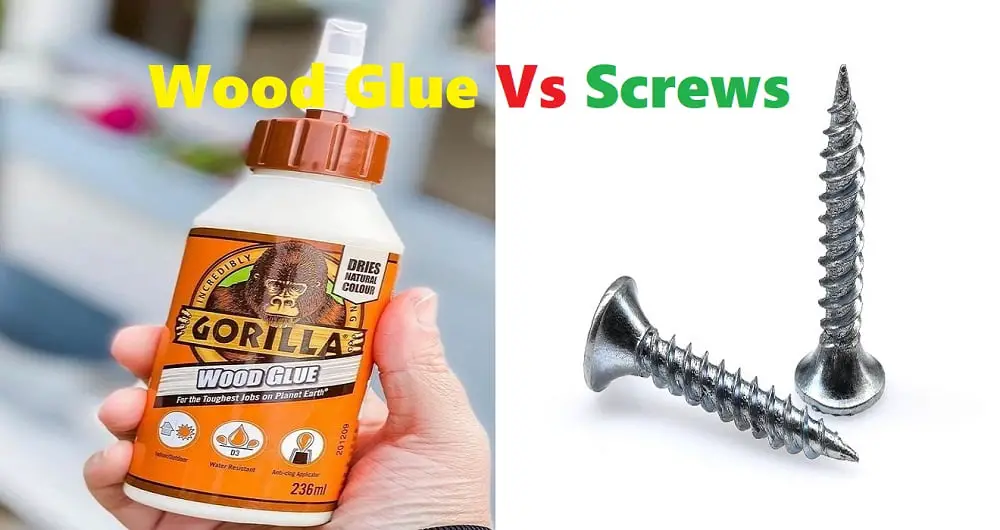
Although carpenters traditionally use screws, nowadays, wood glue is also popular. Are you trying to make a wooden material and are not sure what to use to make a better connection? A comparison between the wood glue vs screws may help you eliminate your confusion.
Wood glue makes a stronger wood-to-wood bond than screws. Besides, applying wood glue is a little bit complex job and requires time to dry. But the wood screws are usually exposed to rust and may require you to use wood filler to hide their appearance.
It is a quick snapshot of their differences. Continue reading till the end to find out every difference between wood glue and screws. You will also find the best products listed in each category before the end of the article.
What is wood glue used for?
Wood glue is a variety of glue that is particularly made for attaching pieces of wood. You can use glue while making different furniture or creating any wooden materials.
Regular glue may not work well with wood, and that’s why you need to find specific glue for woodworking. These glues are pretty strong and don’t detach even if you try to separate the wood.
Pros:
- Super strong
- Extremely durable
- Transparent look
- No need to create holes
- Some wood glues are waterproof
Cons:
- It takes time to dry
What is a wood screw?
Normal screws come with coarse thread, while a wood screw usually has a sharp thread. It makes it easier to put the screws through the wood. Some wood screws may be a little bit coarse to make hardwood joints stronger.
Using screws is the most common method of joining multiple kinds of wood. You can use screws with all kinds of wood. Besides, you can detach them when you need to.
Pros:
- Excellent grip
- Suitable with all wood
- Easy to use
- No need to dry
Cons:
- Most screws attract rust
Wood Glue vs Screws: Quick comparison chart
| Basis for comparison | Wood Glue | Screws |
|---|---|---|
| Bond strength | Superior | Good |
| Drying & curing time | 24 hours | Not required |
| Ease of applications | Complex | Easy |
| Wood filler | Not required | Required |
| Durability | Excellent | Good |
| Waterproof | Mostly yes | Mostly no |
| Reversibility | Not detachable | Detachable |
| Visibility | Transparent | Visible |
Wood Glue vs Screws: Key differences

The table above gives you a quick idea about the major differences between wood screws and glue. Following is a detailed explanation of the features that separate wood glue and screws:
1. Bond strength
Both the wood glue and screws create a strong bond between wood to wood. However, if you use good wood glue, then it will result in a stronger bond than the screws.
If you try to separate the wood after applying glue, you will most probably be unsuccessful. You may end up breaking the wood instead of separating them. That means wood glue can be stronger than the wood itself.
But if you try to separate two pieces of wood that you have attached with screws, you may be able to separate them with enough pressure.
2. Ease of applications
Applying wood glue and putting screws to wood is relatively easy. But I think applying wood glue to the wood properly is a little bit more complex than screws.
You will need to spread the glue all over the wood surface well. Besides, you need to take care of the thickness to avoid making it extra thick. Applying wood glue is also time-consuming.
In contrast, you can instantly put screws into the wood using a hammer, and the work is done. Although you need to ensure safety here, if you know how to do it, the work will be pretty easy and quick. That’s why I think using screws is easier.
3. Drying & curing time
You will need to give some time for the wood glue to dry. It takes around 10 to 25 minutes on average to dry. Then you will also need to keep it for around 10 to 24 hours for curing. After that, the wooden materials will be usable.
The good thing with screws is that they don’t need to get dry. Insert a few screws in the wood, and they are usable instantly without wasting any time.
4. Wood filler
When you apply wood glue, it doesn’t create any holes. Therefore, you will not need to use any wood filler. In fact, some glue has thickening agents that can fill tiny holes in wood.
But when you use screws, they create a hole in the wood. Therefore you may need to use wood filler to hide those holes.
5. Durability
Both the wood glue and screw have excellent durability. But screws are made of metal and exposed to rust. Although they are quite well maintained, I have seen them serving well even after decades.
However, some wood glues are waterproof while others are not. If you get waterproof wood glue, it will serve you a lifetime, even in harsh weather outdoors. Even non-waterproof wood glues are durable if you use them indoors.
6. Reversibility
Sometimes you may make mistakes and attach wood pieces in the wrong way. Again, sometimes you may want to change the structure of the wooden materials or may want to make something new out of the old wood furniture.
What I am trying to indicate here is that you may need to detach the wood pieces. It is possible to reverse the screw connection in wood, but you can not do that after applying wood glue.
There are some solutions available online that may help you to reverse glue joints. But that is good only within 24 hours of application. After that, you may not be able to separate them.
7. Visibility
Most wood glues are transparent when they dry. Therefore they do not create any visible appearances on wood after applying. But screws are visible on the wood like the light in the dark.
That means you don’t need to do anything to hide the glue as they are not visible at all. But you will need to apply wood filler or other solutions to hide screws.
When to choose wood glue over screws for woodworking?
You should go with wood glue instead of screws when you want excellent strength with fewer or no visible appearances. It is a perfect solution for attaching medium to large wood surfaces
Besides, wood glues are best for fixing broken wood pieces. If you break any wooden materials at home, use good wood glue instead of screws to avoid further damage.
Besides, you may not be able to use screws when making small crafts with wood. Wood glue can be a perfect choice over screws in such situations.
When to choose wood screws over wood glue for woodworking?
Wood screws are good for joining wood pieces while making furniture. They can hold medium-sized wood pieces perfectly well. Besides, wood screws are good for making wooden cabinets.
You should use wood screws when you need grip strength and if there’s any possibility that you may want to reverse the connection later. Wood screws are less hassle and quick solutions to woodworking compared to screws.
2 Best Wood Glues for crafting & fixing wooden materials
You will need the best wood glues to get the best results. Here are two of my favorites wood glues that create a strong bond and are highly durable:
1. Gorilla Wood Glue
Gorilla wood glue is certainly one of the best wood glues available on the market. It has excellent strength and is suitable for both indoor and outdoor usage. Gorilla glue’s superb adhesion strength makes it a perfect choice for both softwood and hardwood.
2. Elmer’s E7310 Carpenter’s Wood Glue Max
Elmer’s E7310 Carpenter’s Wood Glue Max is another excellent wood adhesive that comes with excellent durability. It usually dries faster than other wood glues and is good for versatile usage. Elmer’s Wood Glue offers a perfect finishing and can be a good choice on a budget.
Related: Elmer’s Wood Glue vs Gorilla Wood Glue
Best Wood Screws for making any wooden furniture and cabinets

Depending on your woodworking projects, the size of the screws will vary. However, the following two screws are most popular for woodworking:
1. Silver Star Stainless Steel Wood Screw Torx/Star Drive Head
The Silver Star Stainless Steel Wood Screw is one of the best stainless steel screws for woodworking projects. It has a bugle head with a Torx driving system. Besides, the screws come in different sizes to match your requirements. In short, a perfect wood screw for all kinds of usage.
2. Gold Star Wood Screw Torx/Star Drive Head
If you are looking for long wood screws, then I recommend you buy the Gold Star Wood Screw. It’s thin, long, and suitable for both softwood and hardwood. You can use it with thick wood pieces due to the extra lengths. Besides, the Gold Star Screw has a zinc exterior finish that protects it from rust making the screw perfect for both indoor and outdoor usage.
FAQs
Wood glue can be stronger than screws, and you can often use them alternatively. But wood glue can not replace the screws completely. There are certain occasions when screws are necessary.
Yes, you can use wood glue in screw holes to fill the hole or make the joint stronger. If the hole is larger, you may need to add a little bit of sawdust with the glue to get better results.
Wood glues are usually not good for metal-to-metal connections, but they can hold metal screws to the wood. You can use wood glue after inserting screws to hold the screw in place for longer.
Permatex 28205 Screw Glue Repair Gel can hold screws in place in the wood. Besides, the glue is also excellent for attaching wood to wood or wood to screws or fixing broken screws.
Wood glue vs Screws: Who wins?
After comparing wood glue vs screws, I can tell you that both are equally necessary for woodworking. You can not rely on only one substance. However, you can use both the glue and screw together to make the connection stronger. First, insert the screws and then apply the wood glues to make a stronger joint.

